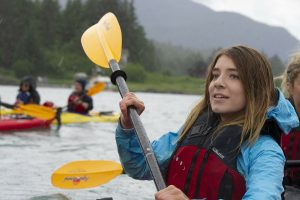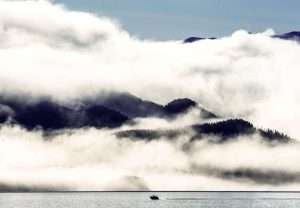Tribal Sovereignty Leads to Food Security for Community of Kake
In early April 2020, Joel Jackson was taking action to ensure his community of 550 people had access to food and basic essentials. This past spring as the pandemic began to escalate, the availability of food and goods became limited across America. The challenge of getting goods to the stores in rural Alaska was unreliable. Jackson and the federally recognized tribe for Kake began to examine what options were available.

Joel Jackson is the tribal council president for the Organized Village of Kake (OVK). “When the pandemic showed up, we had a shortage of meat to purchase,” said Jackson. “I thought, we have moose and deer around our community — why not ask for special action for a moose and deer hunt.”
A Journey Begins for Special Action
Food supplies in Kake come from either a small grocery store or harvesting from the land. Kake’s only grocery store offers food and essentials you find in a typical small grocery store. Some residents supplement the grocery store finds with trips to larger communities via the Alaska Marine Highway System. For those who can afford it, traveling by ferry allows access to larger communities and an opportunity to buy in bulk. But it’s not as easy as making weekly trips to Safeway or Fred Meyer. For Kake, the community hadn’t seen a ferry in six months until mid-June 2020. (KCAW Summer schedule promises smoother sailing)
Because of a lack of food on the shelves and zero ferry service, Jackson and the tribe began a journey for special action. They began with the State of Alaska, but with limited state lands around Kake, the next step was the U.S. Forest Service Ranger District offices. The request eventually made its way to the Federal Subsistence Board. On June 22, 2020, the board took action on a wildlife special action request from the OVK. The emergency moose and deer season in Unit 3 for the community of Kake was approved 7 to 1.
In its press release, the board supported the emergency season for reasons of public safety related to food security concerns in Kake, due to intermittent and unreliable food deliveries. Dave Schmid, Alaska regional forester for the U.S. Forest Service explained why he voted in support of the measure, “I would say given the level of food insecurity that you heard are facing the community, approving this special action — it’s the right thing to do.”
The federal subsistence board includes representatives from across the state, including chair Anthony Christianson, who also serves as the mayor of Hydaburg, Alaska. The board provides guidance to the Federal Subsistence Management Program on matters related to helping rural Alaskans with the opportunity to provide for a subsistence way of life on federal public lands and waters while maintaining healthy populations of fish and wildlife. The emergency season includes a community harvest of up to two bull moose and up to five male Sitka black-tailed deer. Jackson says under the emergency hunt they have one more moose to harvest before July 24.

Once the moose and deer were harvested, Kake came together to package and deliver moose and deer meat to the community. Youth from the Kake Youth Conservation Corps helped butcher the moose. Another crew cut and packaged the meat.
Jackson says the emergency season provided about two meals per household. He says it may not be much, but it is helping to get meat ahead of the regular deer season that begins on August 1.

Elders were the first to receive the meat from the emergency hunt. Jackson says feeding the Elders first is “part of who we are, and when you feed the Elders, you are lifting their spirits.”
For Kake residents who don’t have deer or moose meat in the freezer, the alternative is purchasing from the store. Jackson says the pandemic has made it difficult to get essentials, let alone quality food or goods to rural communities like Kake.
Sealaska has advocated for continued and adequate funding for the Alaska Marine Highway System. It has been one of the highest state public policy priorities for shareholders and Sealaska.
OVK Wants Further Action
The emergency hunt for Kake is administered by the U.S. Forest Service, Petersburg Ranger District. The tribe is managing what the community is harvesting and the distribution of meat. Jackson wants to demonstrate that a federally recognized tribe has the governance to co-manage customary and traditional subsistence uses of resources. The tribe has the ability to issue emergency hunting or fishing permits to its tribal members if needed, but have not had to use that option.









 Previous
Previous